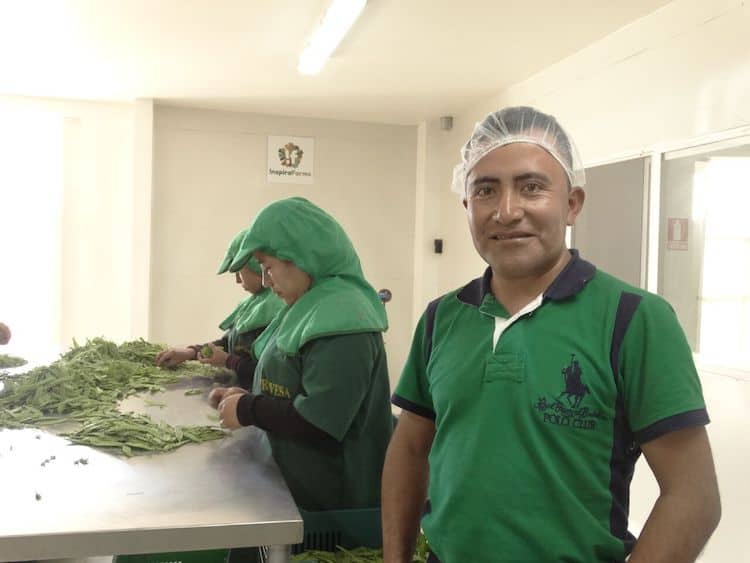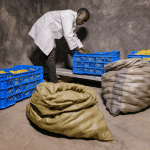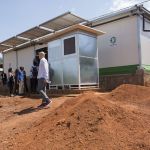Rethinking Food Security By Re-inventing the Cold Storage Chain
With climate change intensifying, food security becoming a political issue and the incidence of food borne illnesses on the rise, the mathematics of feeding a global population on its way to 9 billion can seem like an insurmountable challenge. That’s especially true when viewed with the baggage of history and its mandate for infinite growth on a finite planet. Small wonder that so many of us seeking solutions to big, systemic challenges have fallen into the trap of seeking big, systemic solutions.
For those working in agriculture in the developing world, and for the innovators beyond, one thing is clear: Looking to industrial scale agriculture to solve these problems is not an option. And it’s this realization that has motivated a new generation of agribusinesses to adopt a grassroots, community-centric approach to problem-solving.
One key problem is that of food waste. And one such business addressing it is our company, the UK-Italy based agricultural technology firm InspiraFarms. Now in our fifth year, we’re on a mission to change the global food industry—one small agribusiness at a time. It’s a lofty ambition, backed up by a surprisingly simple approach: Provide farmers and entrepreneurs in the developing world with clean technology to prevent post-harvest food loss, and engage in high-value processing activities.
“In developing countries, 40 percent of food losses occur after harvest and early on in the supply chain,” explains Tim Chambers, InspiraFarms’ co-founder and managing director. “That translates to more than 250 million tonnes of food waste annually—mostly because of inadequate refrigeration and unreliable and expensive energy supply.”
The knock-on effects are lost income for small operations, lost employment opportunities for the community and higher prices for poor consumers.
It’s a compound problem our company’s founders understand well. Chambers and InspiraFarms’ Technical Director Michele Bruni had worked for years in the agricultural aid sector and witnessed first hand how an issue like diesel dependency could snowball. When faced with exorbitant operating costs, small-scale producers are prevented from increasing capacity and engaging in the sort of processing activity that would increase the value of their operations, and ultimately benefit their communities – not to mention the market.
With these insights, Chambers and Bruni began looking at ways of increasing smallholder productivity in countries such as Mexico and Guatemala, before determining the solution was simple enough: food safety certification-ready cold storage and processing spaces capable of operating off-grid.
The implementation, however, required a little more thought, and a great deal of design iteration and planning. The team agreed their solution needed to be modular, adaptable, affordable, and operationally independent of expensive fossil fuels, deep technical knowledge, or outside interference. After almost two years of research, development and beta testing, we had a go-to-market product that satisfied all criteria, and then some.
Our lightweight, modular units are flat packed and shipped ready to assemble. Installation is quick, as is disassembly, meaning clients can move the units easily if needed. When coupled with InspiraFarms’ photovoltaic and remote monitoring systems, a client is able to transform their business from a fossil-fuel dependent farm to an energy independent, tech-enabled agribusiness literally overnight.
Today, our technologies have enabled 12 small to medium-sized agribusinesses, including Rwanda’s GET IT, to grow by accessing affordable finance that allows them to build sustainable supply chains and food-safe certified processing capacity.
A text-to-order grocery service, GET IT had estimated it lost nearly 20 percent of its fresh produce due to a lack of cold storage. After adding InspiraFarms cold storage facilities, the company was able to stem losses and significantly increase its capacity. Now, it’s delivering more than 10 tonnes of goods per week—sourced principally from local smallholders—and it recently became Rwanda’s first ISO 22000-certified supplier of fruits and vegetables. By meeting international standards for food safety management, the company is now ready to take on scale clients such as corporations and service chains, including hotels and restaurants, and to access the lucrative export market.
We’ve seen business results like these with other clients, which range from small-scale agricultural producers and distributors like GET IT, to farming cooperatives and large corporate retail chains and food processors seeking supply chain efficiencies and evidence of social responsibility.
“Because trading and processing companies are almost obliged to consider smallholders as suppliers for the future, technologies with alternative financing options like ours have become a strategic advantage,” said Bruni.
Edgar Cancax, a local vegetable small farmer from the highlands of Guatemala, is another example of how our technology can impact small-scale agribusinesses – and our first test of extended payment terms (two years). After adding a food-safe certified InspiraFarms cold chain processing plant, Cancax reduced losses by 25 percent, grew his staff by 60 percent and doubled his monthly production to over 100 tonnes. Diversifying into processing has allowed Cancax to develop partnerships with three large agro-processors and make valuable inroads into exporting. Cancax is also close to paying off his facility. Currently, this is where we see the greatest growth potential – not only for the company, but also for its clients.

After adding a food-safe certified InspiraFarms cold chain processing plant, Guatemalan farmer Edgar Cancax reduced losses by 25 percent, grew his staff by 60 percent and doubled his monthly production to over 100 tonnes.
Having helped to create more than 600 jobs in three countries over five years, we have set our sights on the future and the growing need for value chain traceability. With a recent Series-A investment of €1.65 million (US $1.97 million), through partnerships with PYMWYMIC, Factor(e) Ventures, Energy Access Ventures, the Montpellier and Doen Foundations, we are investing in the development of our remote monitoring software, as well as our service offering, which includes technical assistance and interest-free financing.
Last year, we were excited to learn that InspiraFarms was recognized by the nonprofit B Lab as being one of the B Corporations creating the most positive overall impact on its customers. And that’s a vindication for a company that opted to develop a community-centric approach to solving a big, systemic problem.
Paula Rodriguez is Community and Client Relations Manager at InspiraFarms.
Photos courtesy of InspiraFarms.
- Categories
- Agriculture, Technology



